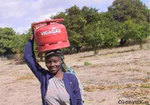Partnerships bring fuel services to northern Mozambique medical clinics
In a country with 500 doctors for almost 20 million people, initiatives that can expand the reach of health services to rural people are in critical demand but in short supply. In northern Mozambique, the big challenge for health clinics is the lack of reliable fuel to light medical operations and to guarantee regular refrigeration for vaccines. And with less than 2% of households connected to electricity, many depend on wood or charcoal for cooking.
This increases respiratory infections, pregnancy complications and forest degradation. In this context, partners gathered in 2002 to launch a pilot project to bring fuel services to northern Mozambique. These included a former minister of education dedicated to children’s health, a Seattle-based nongovernmental organization delivering health supplies, philanthropists willing to back the startup financially, Mozambique’s Ministry of Health, the governor of the pilot province and Fundação para o Desenvolvimento da Comunidade (FDC), a community foundation intimately familiar with Mozambicans’ complex development needs. As a result of the partnership, VillageReach and FDC introduced an improved cold chain and replaced decrepit kerosene refrigerators in remote health facilities with liquefied petroleum gas–powered refrigerators. The case focuses on the supply of liquefied petroleum gas to businesses and households by VidaGás, a for-profit company owned and controlled by the two nongovernmental organizations, now trying to develop a viable business model.


